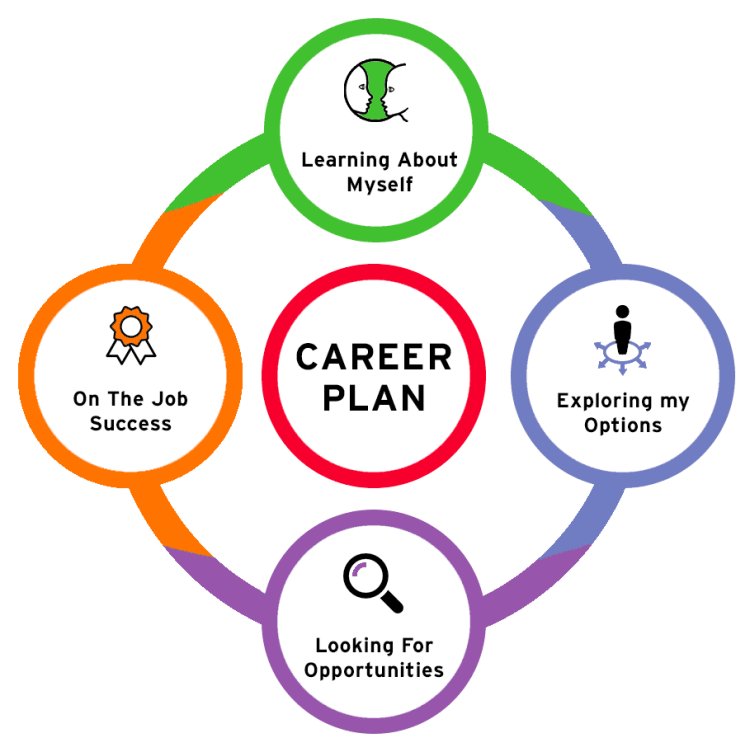The 6 Stages Of Career Development
The 6 Stages Of Career Development, and Courses to Help Evolve Your Skill Set · Stage 1: Assessment · Stage 2: Investigation · Stage 3: Preparatio

The average speed of Earth's rotation is calculated to be around 1,000 miles per hour, give or take a few miles per hour depending on your latitude. However, due of its perpetual motion, its actual velocity is impossible to gauge.
Your professional life is in a similar position.
After taking off, a chain reaction begins, with each stage influencing the next. These phases are variable but constant; they apply whether you settle somewhere for the long haul or move about quite a bit.
Here is a look at the six tiers of job advancement as outlined by the United States Chamber of Commerce to help you take a breather. Aligned learning courses can help you assess your current situation and locate the tools you need to make the most of the future.
Stage 1: Assessment
As they emerge from the starting blocks, most people are full of optimism and ready to attempt anything in order to gain a foothold on the next rung on the ladder to success.
In this stage of development, you should begin to reflect on the specific abilities and traits that make you you. How do you set yourself apart from the other ambitious professionals who also want to make a name for themselves?
Spend some time now analysing the responses you've gotten so far. Keep in mind that you can get just as much, if not more, knowledge from criticism as you can from compliments. Consider taking a course like "Discovering Your Strengths" to better understand your existing gifts, loves, and skills, and use the results to guide your future emphasis.
Stage 2: Investigation
Perhaps the word "intriguing" best describes this current phase. For the simple reason that as you progress in your professional education and uncover the mechanisms at work in your field, you will inevitably run upon seasoned pros a few years your senior who will gladly share their insights. Or how they ought to operate.
Every idea is worth considering. Especially if you can maintain your attitude optimistic and your mind open to the possibilities that are starting to emerge. It's normal to feel nervous when you're first starting to network or thinking about taking the next step in your career. Be sure to nurture your network strategically, and think about enrolling in a course like this to help you plot your next professional steps.
Stage 3: Preparation
You've come a long way, baby, and you should be proud of yourself. By now, you've probably had some success, been recognised by your peers, and have a better idea of what it takes to advance in your chosen field.
Of course, your business card probably doesn't reflect the ideal title you have in mind just yet. But admitting that is itself a positive development. It's time to channel the energy of forward motion and challenge yourself with new aspirations.
You may set yourself apart from the competition by practising how to explain your value. Not everyone is comfortable with self-promotion, yet the ability to communicate well in this area is crucial to your professional development.
Stage 4: Commitment
You're one of the company's "go to" folks, so expect to take on additional responsibility. You seem at ease because you're following your heart and doing what you think you were born to do.
Keep moving forward on your journey and draw inspiration and guidance from the supportive community you've built. Now is the time to keep an eye out for internal and, if applicable, external promotions. Think carefully about what you want out of life and how you may get it by balancing your job and personal lives.
Stage 5: Retention
It's easy to feel complacent as you advance in your career and take on additional leadership responsibilities. Watch out for the shiny gold handcuffs. Don't lose sight of the future and your dedication to constant development. To cease gaining knowledge is to cease developing.
Invest some time now in skill-building programmes that will enable you to keep up with changing technologies, practises, and expectations in your field. And give yourself permission to dream about the next big thing you want to do in your professional life.
Stage 6: Transition
Recognise that any anxiety or doubt you feel now is a natural response to your past triumphs, and welcome it with open arms. It's normal to reach a plateau in your current role, company, or field and to long to see where else your career can take you.
Finding your next step at this juncture can feel like starting from scratch, but it's not. Rely on the connections you've made and the expertise you've built over the years. Clearly state your goals. Choose wisely. Your skill and determination can either keep you on the path you're on or open doors for you to explore new opportunities and fields.
Evolve Your Skill Set
It's likely that you'll see one or more of these phases again, possibly many times, no matter where you are on the revolving door that is your career path. Making the decisions that will lead to professional success is a never-ending circle that requires careful thought, preparation, and a good dose of patience from each of us.
Make the most of any chance that comes your way by taking advantage of these classes that will help you brush up on your knowledge, acquire new abilities, or change careers altogether.













